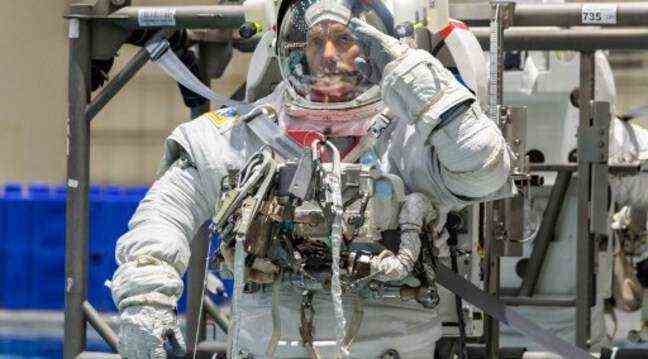Thomas Pesquet in training, June 19, 2020, at the Neutral Buoyancy Laboratory (NBL) in Houston (Texas). – BILL STAFFORD / NASA / AFP
- Thomas Pesquet will return to the International Space Station on Thursday for six months.
- Its mission, codenamed Alpha, will aim to contribute to a hundred international scientific experiments. The astronaut will also take control of the ISS for a month, towards the end of his mission.
- Three days before departure and before a final take-off rehearsal on Wednesday, Thomas Pesquet spoke at a press conference from Florida.
Ready for take off. Smiling and calm, Thomas Pesquet appeared before the journalists on Monday afternoon for a final press conference before the big take-off scheduled for Thursday, shortly after noon, since
Cape Canaveral, in Florida.
The French astronaut, who has become a rock star in France since his first stay aboard the International Space Station (ISS), between November 2016 and June 2017, returns this Thursday in Space. Still heading for the ISS, a weightless laboratory 400 km above the Earth, which he will join for six months with three teammates: two Americans and a Japanese.
Take off this time aboard Space X’s Crew Dragon
This Alpha mission – its code name – still presents something new for its launch. Thomas Pesquet will not take off on board a Russian Soyuz launcher, as for his first mission, but with the Crew Dragon 2 spacecraft from Space X. The Frenchman will thus be the first European to travel aboard a capsule owned by billionaire Elon Musk. The crew will stay there 23 hours before reaching the ISS.
A change in size? “The public may not have realized it, but the Soyuz has two volumes: the cockpit, which we always see in the photos taken from take-offs, and a living space just above, where you can eat, sleep…, answers the French astronaut. The Crew Dragon has only one. But that does not change much in the end, this single volume being more spacious. “And in terms of piloting, the Space X capsule” is more modern, more automated, with super comfortable information representation modules for the crew … “, continues the Frenchman.
A dress rehearsal took place on Sunday, a final one will take place on Wednesday. “The rocket is ready, the spaceship too…, Thomas Pesquet assures us this Monday. And the crew are happy and in great shape […] All is well so that we can enjoy our last days on Earth before leaving the planet for six months. “
A second trip more difficult than the first?
A stay that he dreads? Thomas Pesquet seems in any case serene on the takeoff part. “I think the second trip will be more difficult than the first,” he replies. Physically, maybe not, because I feel like I’m in the best shape of my life right now, even though I’m a little older a few years. On the other hand, mentally, Thomas Pesquet expects it to be more difficult. “For a first trip, we’re going on an adventure, we know it’s going to be difficult because we’ve told you and we imagine it,” he says. But it is not clear how much, what exactly is going to be difficult and when. The second time, yes. “
The Covid-19 pandemic hasn’t helped either. “It did not make the preparation easy, since we found ourselves isolated from the training sessions,” says Thomas Pesquet. We are preparing to leave our loved ones for six months, but unfortunately, we have been in isolation for almost a year. It’s not great. Like everyone else, I would have liked more freedom in the past year. But of course, when you go to Space, you can’t complain. “
Commander of the ISS for three months
Especially since aboard the ISS, Thomas Pesquet will not have time to be bored. More than a hundred scientific experiments await him aboard the ISS. “One that I like a lot is an experiment on ‘mini-brains’. The space environment is like an accelerated model of aging, wonderfully reversible, so we will try to look at its effects on the brain, by assembling cells in Petri dishes, ”he told AFP on the 16th. last march.
Four “extra-vehicular” outings are also scheduled, the most important of which will consist of the installation of new solar panels, “enormous tubes weighing 350 kilos”. Above all, Thomas Pesquet will take command of the ISS for a month, towards the end of his mission. He will thus be the first Frenchman to command the International Space Station at the same time as he will become, at the end of this second trip, the Frenchman who has spent the most time in space.

